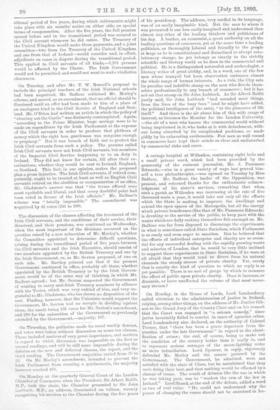A cottage hospital at Willesden, containing eight beds and a
small private ward, which had been provided by the generosity of the eminent journalist, Mr. J. Passmore Edwards,—who in a great variety of ways had proved him- self a true philanthropist,—was opened on Tuesday by Miss. Balfour. Mr. Balfour, the leader of the Opposition, was present, and returned thanks for the enthusiastic acknow- ledgment of his sister's services, remarking that when such a parish as Willesden was increasing at the rate of five thousand souls a year, it would take not only all the efforts, which the State is making to improve the dwellings and extend the open spaces of the Metropolis, but all the energy which private beneficence (like that of Mr. Passmore Edwards) is devoting to the service of the public, to keep pace with the wants which are daily making themselves felt amongst us. Mr. Balfour was far from disposed to discourage the experimenta in what is sometimes called State Socialism, which Parliament is so ready and even eager to sanction. But he believed that the efforts of individual enterprise and charity are so essen- tial for any successful dealing with the rapidly growing wants and miseries of London, that he would be very little inclined to support these experiments in State Socialism, if he were at all afraid that they would tend to divert from its natural channels the steady stream of private charity. Yet, surely that is exactly the kind of question to which no reply is as yet possible. There is no sort of gauge by which to measure the effect of public upon private charity. Does it increase, or diminish, or leave unaffected the volume of that most neces- sary stream P


































 Previous page
Previous page